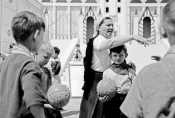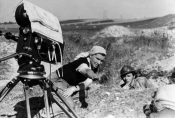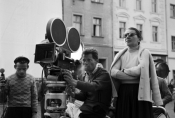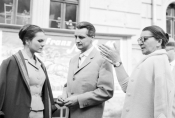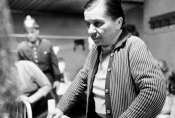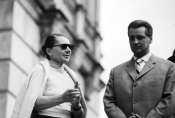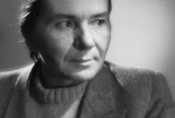Wanda Jakubowska
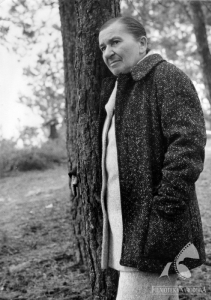
Film director, screenwriter. She was born on October 10, 1907 in Warsaw. She was a graduate of art history at the University of Warsaw. Before the war, she was making documentaries and reportages. In 1930, she was one of the founders of the Association of Art-House Film Lovers "Start" (dissolved in 1934), which consisted of socially involved supporters and ambitious cinema of high artistic quality. A year later (1935), she was one of the founders of the Filmmakers Cooperative (SAF), the purpose of which was making films for social institutions. Her feature debut was a film adaptation of the novel by Eliza Orzeszkowa Nad Niemnem/On the Banks of the Niemen (1939), which unfortunately never had its premiere. During the war, the film negative was lost.
During the German occupation, she was involved in the resistance movement, for which she received the Officer's Cross of the Order of Polonia Restituta in 1949. In 1942, she was sent to the Auschwitz concentration camp and then to Ravensbrück. She addressed her experience in the camp in her most famous film – Ostatni etap/The Last Stage (1947), interpreted as a protest against the Nazi genocide. It is considered the world's first feature film about the Holocaust. The film won the Grand Prix at the Festival in Marianske Lazne, and gained international renown. She addressed the theme of the camp on two more occasions: in Koniec naszego świata/The End of Our World (1964) and Zaproszenie/Invitation (1985). Her film Spotkania w mroku/Meetings in the dark (1960) was also set during the occupation. She directed a biographical film about General Karol Świerczewski, Żołnierz zwycięstwa/Soldier of Victory (1953) and a story of a Foreign Legion soldier, Opowieść atlantycka/Atlantic Tale (1954). She addressed contemporary themes in Pożegnanie z diabłem/Farewell to the Devil (1956), Historia współczesna/Modern Tale (1960), Gorąca linia/Hotline (1965) and 150 na godzinę/150 per hour (1971). She directed a film adaptation of Janusz Korczak's fairy tale Król Maciuś I/King Matt I (1957), with visionary set design by Anatol Radzinowicz.
She was an advocate of the idea of filmmaking teams, which she made the basis for the structure of the Polish cinema she co-created after the war. She was the head of such teams – the ZAF Film Studio (1948-1949) and then the “Start” Film Studio (1955-1968). For many years (1949-1974) she worked as a lecturer at Łódź Film School.
In 1950, she was awarded the International Peace Prize. For her work received the National Award on several occasions as well as the Order of the Banner of Labour 1st Class. She was involved in social work. Two years before her death, she was honoured with the Award of the City of Warsaw for her contributions to the welfare of the capital.
She died on February 25, 1998 in Warsaw.
Selected filmography
-
1947
THE LAST STAGE
